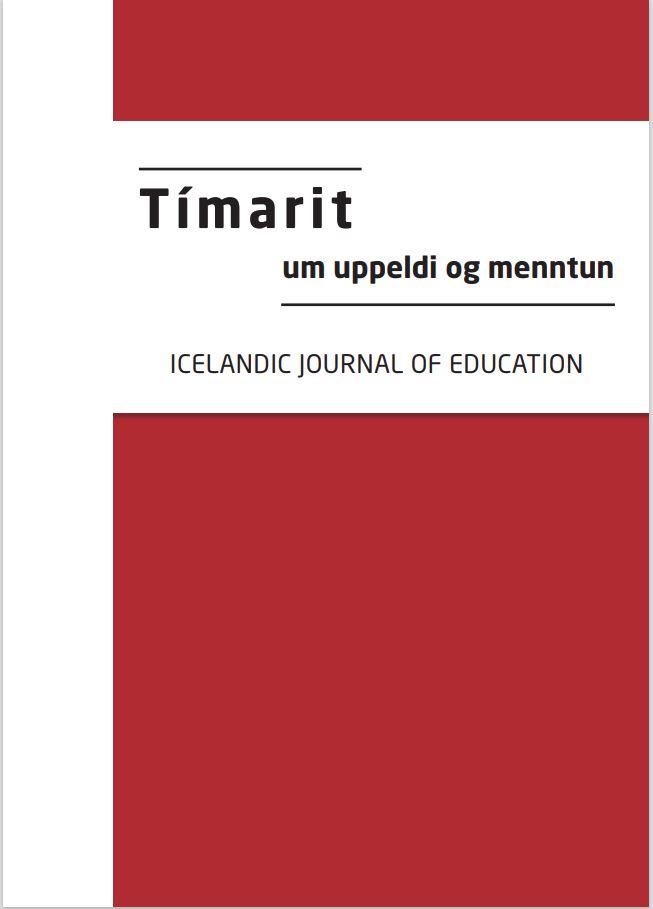Preschool student Teachers' practicum
Dialogue and partnership about the third space
DOI:
https://doi.org/10.24270/tuuom.2023.32.1Abstract
In Iceland, preschool teacher education takes five years — three years of undergraduate study (B.Ed.) and two years of graduate study (M.Ed.) — and the study is both academic and on-site learning or field practice, wherein mentoring is an important part of the education and students’ professional development and application of theory. Almost all of the students in preschool teacher education in Iceland work in preschools during their studies and have extensive experience upon commencing. Many municipalities support them by, for example, paying their salaries during field practice, even though their practice is at preschools where they do not currently work, and also while the students participate in on-site sessions at university. On the national scale, Iceland’s Ministry of Education and Culture also recently instituted partially paid internship for students earning their master’s in education, such that students are recruited in half-time positions that award 30 ECTS credits. Universities in both Akureyri and Reykjavík currently offer such paid field practice. The study presented here focused on traditional field practice among education students at preschools other than where they work and how they collaborate with university teachers and mentors. The aim of the study was to obtain the stakeholders’ experiences of their collaborative practices and to acquire information as to their attitudes toward field practice.
The theoretical background of the paper is rooted in partnership in teacher education, focusing on Smith’s (2016) and Halvorsen’s (2014) definition of true partnership. Qualitative interviews were conducted with local politicians serving on educational councils, preschool teachers specializing in mentoring programs, and university teachers with authority or influence over preschool education and field practice in some way. Thematic Analysis was used to code the data and to find themes. The data was coded in ATLAS.ti 8, from which codes were chosen and themes identified.
The findings demonstrated three themes: stakeholders’ experiences of collaboration, participants’ attitudes toward field practice, and shared goals: working toward professionalism.
Overall, the findings revealed that consultation and collaboration among the stakeholders had been insufficient. Participants reported a limited flow of information and stated that decisions were often made by other stakeholders instead of themselves. For example, according to the policymakers, the universities and the Ministry of Education and Culture have made the decisions but tasked the policymakers with implementing them. Policymakers added that they trusted professionals working in educational councils to collaborate with other stakeholders on their behalf. Those findings underscore the importance of reinforcing collaboration, involving school offices in such an approach, and thus building a third space. Participants also proposed initiating dialogues between actors in between the systems and enhancing their collaboration that way.
Most participants in this study appreciated the field practice, even if the students were working at another preschool at the same time. University teachers and mentors agreed that students could experiment, receive support, and reflect on theory and practice. One university teacher and a mentor stressed the importance of granting teachers in training the opportunity to be students as well. The mentors added that because the education of the preschool teachers is overseen by individuals who have opted to work in preschools, it is necessary to reconsider field practice within universities. Although policymakers were willing to modify working conditions at preschools, they also highlighted the expense of hiring more staff and educating students at the same time. Participants additionally expressed worries due to the shortage of preschool teachers in Iceland.
In summary, the analysis revealed that all stakeholders, policymakers, mentors, and university teachers emphasized the importance of professionalism in the work of preschools and enhancing the education of preschool students.
Downloads
Downloads
Published
Issue
Section
License
Copyright (c) 2023 Svava Björg Mörk

This work is licensed under a Creative Commons Attribution 4.0 International License.

This work is licensed under a Creative Commons Attribution 4.0 International License.
